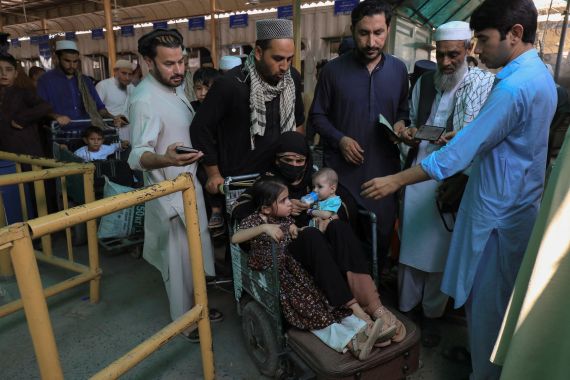Pakistan has issued a deadline of November 1 for nearly 1.73 million undocumented immigrants, primarily Afghan nationals, to voluntarily leave the country or face the prospect of deportation. This government crackdown has cast a shadow of uncertainty over the future of approximately 1.7 million Afghans residing in Pakistan. The announcement comes amidst claims by Islamabad that Afghan nationals have been involved in a significant number of attacks within Pakistan, further straining the already deteriorating relations between the two neighboring nations.
Afghan Nationals Given Deadline for Voluntary Departure
The Pakistani Interior Minister, Sarfraz Bugti, made the announcement, revealing that the government had set November 1 as the deadline for the voluntary departure of undocumented Afghan immigrants. Bugti emphasized that an estimated 1.73 million Afghan nationals residing in Pakistan lack the necessary legal documents to stay in the country. He also pointed out that a total of 4.4 million Afghan refugees currently reside in Pakistan. The government’s stance is grounded in claims that Afghan nationals have played a role in 14 out of 24 suicide bombings that have occurred in Pakistan this year, with Bugti asserting, “We have evidence.”
Uncertain Future Amidst Tensions with Kabul
Pakistan’s decision to push for the departure of undocumented migrants has raised concerns and marked a new low in its already strained relationship with Kabul. Tensions between the two South Asian neighbors escalated following border clashes last month. The Afghan embassy in Islamabad criticized Pakistan’s move, referring to it as “harassment.” The embassy reported that more than 1,000 Afghans have been detained in the past two weeks, with half of them possessing legal rights to be in Pakistan. Despite repeated promises by Pakistani authorities, the harassment and detention of Afghan refugees persist.
Implications for Afghan Families and Legal Status
The announcement has left Afghan families in Pakistan deeply concerned about their future. Fazal Rehman, a 57-year-old Afghan fruit seller in the city of Peshawar, revealed that he arrived in Pakistan three decades ago, and his children have never set foot in Afghanistan. He expressed fear that it might be too late to register with Pakistani authorities. Rehman appealed to the Pakistan government to reconsider, stating, “We request the Pakistan government not to expel us in such a hasty way and allow us either to live here peacefully, or we should be given at least six months to one year time to go back.”
Additionally, starting from November 1, Pakistan will only allow entry to Afghans with valid passports and visas, making it a challenging process for those without proper documentation. Obtaining a passport in Afghanistan can be a time-consuming endeavor, and acquiring a Pakistan visa can take several months.
Furthermore, Bugti’s warning of a crackdown on property and businesses owned by Afghans in Pakistan adds another layer of uncertainty to the situation.
From November 1, Pakistan will significantly tighten its immigration policies, leaving Afghan nationals with a limited window to either acquire proper documentation or face the possibility of deportation. As tensions rise between Pakistan and Afghanistan, the fate of 1.7 million Afghans in Pakistan remains hanging in the balance.















